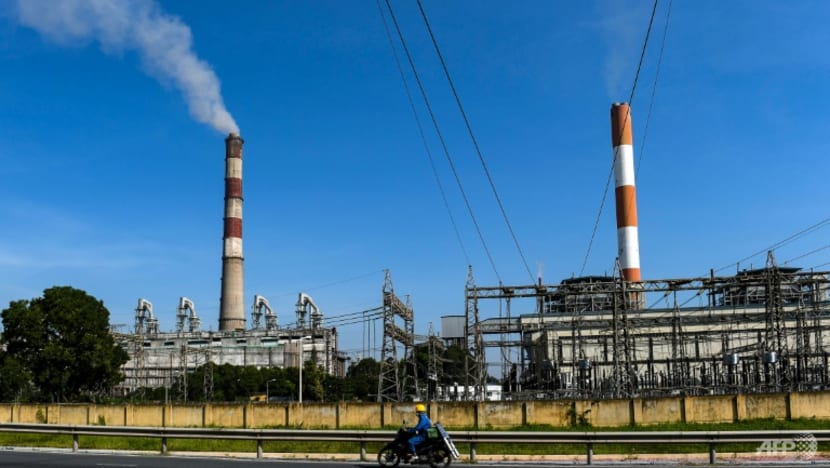Vietnam feels impact of Russia-Ukraine war in energy prices, defence industry
Vietnam's state utility EVN says it could run out of cash by May unless it raises electricity prices.

After China and India, Vietnam has the world's third-largest pipeline of new coal power projects (Photo: AFP/STR)
HANOI: Vietnam may be thousands of kilometres away from the Russia-Ukraine war, but it is feeling the effects of the conflict, particularly in energy prices and its defence industry.
The Southeast Asian country is seeking to hike electricity prices for the first time since 2019 amid the ongoing global energy crisis, following record losses by its state utility.
Vietnam produces around 40 million tonnes of coal each year and imports another 29 million tonnes or so, with most of the coal going towards fuelling the country's power plants.
However, the cost of doing so has increased exponentially.
“Because of the conflict between Russia and Ukraine, the price of coal in the global market in 2022 has increased by sixfold since 2020, and by 2.6-fold since 2021,” said chairman of Vietnam Valuation Association Nguyen Tien Thoa.
Vietnam's state utility EVN has forecast it could run out of cash by May this year unless it raises electricity prices. This comes as the firm expects combined losses of nearly US$4 billion for 2022 and this year.
"I estimate that the increase should be at least 15 per cent in order to support the financial situation of the electricity industry,” said Mr Nguyen Tien Thoa.
However, such an increase will pose challenges to inflation control and “greatly affect” manufacturing and living costs, he noted.
NEED FOR TRANSPARENCY
Vietnam's electricity price currently stands at less than US$0.08 per kWh.
While some experts suggested increasing the price gradually, in phases, others called for transparency from the state utility on how it would derive the figure for a possible hike.
Dr Ngo Duc Lam, an analyst from the Vietnam Sustainable Energy Alliance, acknowledged the need to increase the electricity price because of higher costs, but called for fair competition with more market players.
“It is the market rule. But it should be a true market where there is competition, it should not be a market with solely state utility EVN,” he said.
FEELING THE PINCH
Small businesses in Hanoi's Old Quarter are already feeling the pinch, as prices of raw materials spiral. A kilogramme of coal now costs 50 per cent more, compared to two years ago, and blacksmiths are feeling the heat.
Blacksmith Nguyen Phuong Hung said: "If the electricity price increase is too high, it will be too difficult for people with limited income.
“It will be more difficult for workers. So policymakers need to carefully consider the impact."
Mr Hung said he will pass down any increase in electricity prices to consumers, by raising the prices of his products.
IMPACT OF WAR ON DEFENCE INDUSTRY
The ongoing war has also disrupted Vietnam's plans to modernise its armed forces by 2030, given that the country is the largest importer of Russian arms in the region.
Since Vietnam started its military modernisation programme in the late 1990s, Russia has been its main supplier of weapons and defence systems.
“Vietnam’s planning took place when Russia was the obvious source for everything,” said Emeritus Professor of Politics Carlyle Thayer, from the University of New South Wales (UNSW) Canberra.
But since Moscow’s invasion of Ukraine on February 24 last year, “strategic uncertainty entered the picture”, said Prof Thayer.
It has now become crucial for Vietnam to develop its domestic defence industry and accelerate its diversification of arms imports away from Russia.
“It will push the military to invest more in the Vietnam domestic industrial defence complex. The Vietnamese military has to build, has to make its own weapons in order to meet its demands,” said Mr Nguyen The Phuong, a PhD candidate in the Maritime Security Program at UNSW Canberra whose research interests include Vietnam’s military and naval affairs.
The country has expanded defence cooperation with countries such as India and Israel, with a focus on technology transfer.
But even as Vietnam tries to reduce its reliance on Russia in this area, experts said Russia is likely to remain as its most important source of military arms.


















